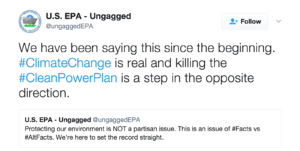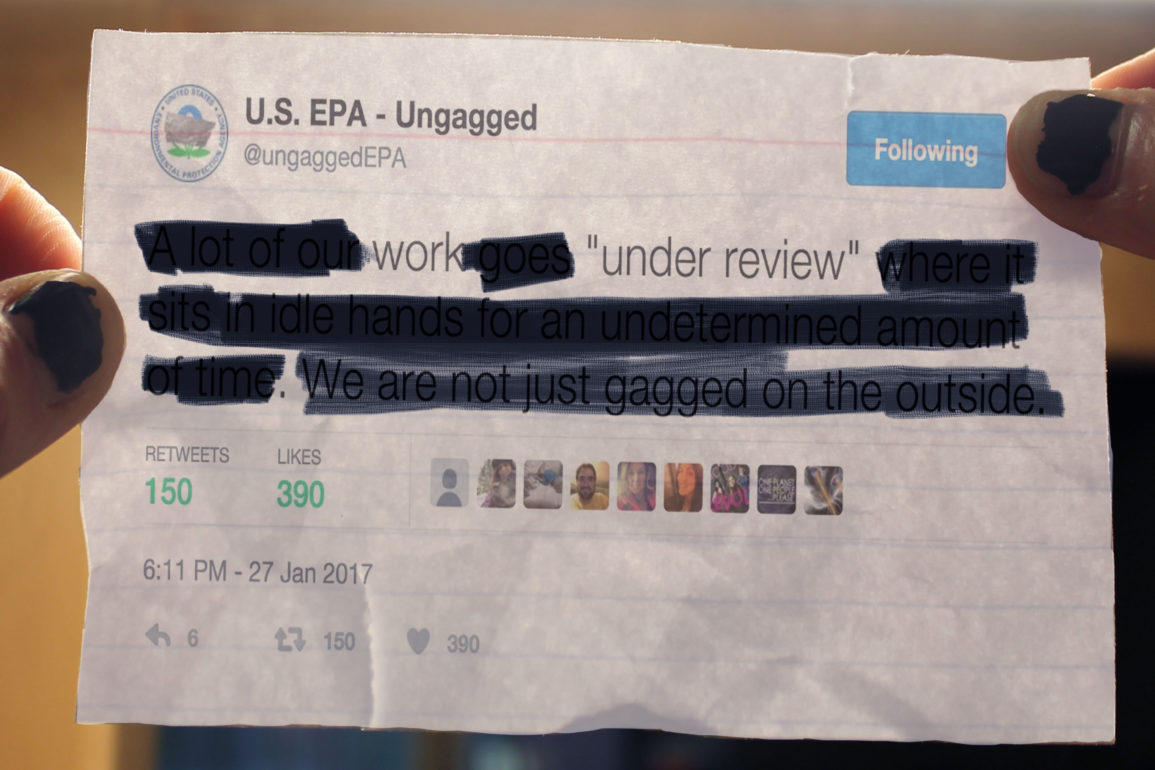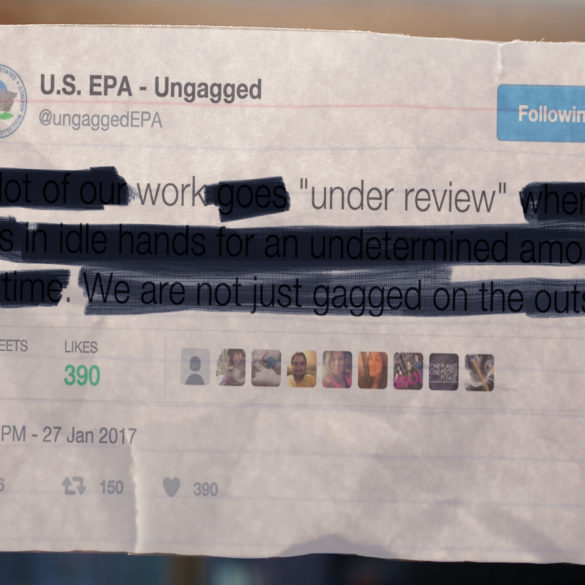Since Trump’s inauguration in late January, the social media accounts of several government agencies have been more limited in what they’re allowed to tell the public, leading to the creation of “rogue” accounts that say what others cannot.
President Donald Trump called for a media blackout of the Environment Protection Agency (EPA) in late January, 2017. The blackout prohibited website updates, social media posts, and business activities. His administration ordered the EPA to take down its climate webpage and that all of its scientists presented their data to be reviewed by Trump’s appointed officials before releasing them to the public.
This followed the appointment of Scott Pruitt, the attorney general of Oklahoma, on December 8, 2016, to the head of the EPA. Pruitt had previously sued the EPA fourteen times on behalf of factories and power plants. His new role meant drastic changes for an agency that, for the last eight years, had worked on backing up climate change facts with information about greenhouse gases, melting icecaps, and rising sea levels. Climate change advocates and government scientists worried their work would no longer make its way to the American public.
In response to the media blackout, more than forty new Twitter accounts were created by anonymous employees and concerned activists. In a matter of days, these accounts sprung up as alternatives to the official feeds from various agencies. These included accounts such as @RogueNOAA, @AltNatParkSer, and @ungaggedEPA.
Although these accounts and their followers would consider the blackout to be censorship, others would disagree.
Charles Taylor, a political science professor at Ball State, says censorship is when the government limits the ability of some private person or organization to speak. The National Oceanic and Atmospheric Association (NOAA), the National Park Service (NPS), and the EPA, all government agencies, don’t fall under his description.
Taylor says that whether you agree with President Trump or not, the agencies are a part of the executive branch, and therefore they work for the president. They have to carry out the policies of the president and are subject to laws passed by congress.
But those who run @ungaggedEPA think the American people see it differently. They, along with other “rogue” agency accounts, believe executive agencies work for the people, not the president
This account, created shortly after President Trump’s inauguration on January 20, now focuses on sharing climate change studies, criticizing the Dakota Access and Keystone XL Pipelines, and arguing against President Trump’s focus on coal jobs. They post environmental statistics that encoura ge followers to talk with their elected representatives and vote in the upcoming elections.
ge followers to talk with their elected representatives and vote in the upcoming elections.
They believe keeping the public informed is the best way to combat the Trump Administration’s policies and attitudes on the climate. Worried that the pullback of environmental safety regulations could be disastrous for water and air quality, @ungaggedEPA says the public must prepare to take action, with or without the help of Scott Pruitt’s EPA.
 After Twitter’s launch in 2006, executive branch agencies developed their own accounts to post information about their programs and services. This is seen from the national level of the EPA to the state level of the Indiana Department of Natural Resources (DNR) State Parks.
After Twitter’s launch in 2006, executive branch agencies developed their own accounts to post information about their programs and services. This is seen from the national level of the EPA to the state level of the Indiana Department of Natural Resources (DNR) State Parks.
Public relations officers of local, state, and national government offices havealways monitored public statements by government employees to the press. Now they manage what is posted online via social media.
Taylor says every presidential administration has had control of what government agencies are allowed to discuss with the press and the public.
Since the creation of the first government agencies in 1789, many presidents have controlled information they felt was contradictory to their messages. Bill Clinton was infamous for his “Don’t Ask, Don’t Tell” policies that prevented LGBT+ individuals from openly acknowledging their orientations while serving in the military. This, Taylor says, could arguably be considered a form of censorship, as it was intended to regulate speech off the job.
George W. Bush appointed officials to screen interviews and public statements by scientists and employees of NASA, the NOAA, and the Food and Drug Administration (FDA), especially regarding climate change and contraception.
Barack Obama’s administration set a record for denying the most Freedom of Information Act (FOIA) requests by citizens, journalists, businesses, and others who wanted access to government documents and data.
So the controlling of information put out by government officials isn’t new.
After Trump was elected as the forty-fifth president of the United States, he chose controversial figures to lead various agencies. Some of these include private school advocate Betsy DeVos, who Trump chose as Secretary of Education, and fair-housing initiative critic Ben Carson, who Trump chose as Secretary of Housing and Urban Development (HUD). These leadership choices could cause other agencies to have difficulty releasing information under the Trump administration, just like the EPA.
Taylor says “you can draw your own conclusions” about the reasons for these new barriers. He says that since the individuals who want to release information are government employees, they don’t really have first amendment rights to say whatever they want to. They act on behalf of the government agency, and as such, need to follow their rules.
But some “whistleblowers” have leaked information to the press, publicizing what they perceive as wrongdoing.
@RogueNOAA, @AltNatParkSer, @ungaggedEPA, and other Twitter accounts are whistleblowers in their own way:, delivering their messages straight to the people. Controversial events won’t cease to exist, but the digital age has changed how we draw attention to them.
Taylor doesn’t view the media blackout as being censorship or something illegal, b. But he says Trump’s approval process is inconvenient and can slow down communication.
In the meantime, social media accounts are saying what government agencies can’t.





